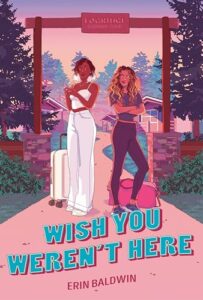Buy this from Bookshop.org to support local bookstores and the Lesbrary!
Enemies to lovers is a popular trope, but most people don’t have full-on nemeses in real life. So in contemporary settings, rivals to lovers is more common: the people you compete with, argue with, and hate. Wish You Weren’t Here presents a lower stakes version of even this: what if you fall in love with the girl from your class who annoys you? You’ve never had a full-on fight, but you both avoid each other and are snippy around each other. That’s the vibe of Juliette and Priya.
As you can imagine, this isn’t the same stakes as a typical fantasy novel’s enemies to lovers story, where you’re both trying to murder each other at every chance. At first, I thought it was too little conflict to be interesting, but as the story continued, I started to appreciate the dynamic. This isn’t the fine line between love and hate, kissing each other in a moment of passion. It’s the confusing moment of seeing someone in a different light—writing someone off and then seeing that they’re very different than you imagined them to be.
The other big factor in this teen sapphic romance is the setting. Wish You Weren’t Here is an unapologetic love letter to summer camp. It’s the only place Juliette feels she can entirely herself. Everywhere else, she’s too “intense.” Here, she’s celebrated for it. That’s why she has such a hard time when popular, rich girl Priya shows up to steal the spotlight: this is supposed to be her safe place. Priya gets everything else, so why does she get to take this from her?
At Fogridge Sleepaway Camp, lifelong friendships are forged. Campers see each other year after year and develop their own inside jokes based on shared history. Juliette adores this place and knows it inside and out; she clashes with a new counsellor partly because she can’t help but consider herself more of an expert and authority on camp. It’s interesting, because I went to summer camp every year, but this is a whole different vibe than my experience. For me, summer camp was a way to reinvent yourself, but it existed in a bubble—I pretty much never saw the same campers year to year. It’s interesting that in the author’s note, she says that she fell in love with summer camp as an adult counselor. Obviously, summer camp means different things to different people, and it was fun to get a glimpse of this version.
I wasn’t sold on this story in first half, partly because while Priya and Juliette bickered—mostly because of Juliette’s prickly personality—there wasn’t that much conflict overall. (Also, the scene with her and her six siblings stressed me out! No wonder she can’t wait to escape to summer camp.) The second half got me, though, because I thought the flirting and tension between them as their relationship shifted was so well done.
I ended up enjoying this more than I thought I would, and it was such a fun summer read. I read this partially in print and partly as an audiobook, and I recommend both. The short chapters—all of which have fun titles—make this a quick read, and I think anyone who has a soft spot for summer camp will get a dose of nostalgia. (Follow this up with That Summer Feeling by Bridget Morrissey if you start dreaming about adult summer camp!)

